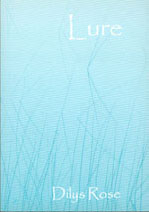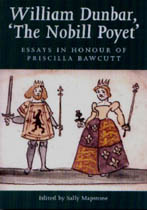Bawcutt
The Lure of Willie Dunbar
 Dilys Rose Lure Chapman Publishing ISBN 1903700078 £6.95
Dilys Rose Lure Chapman Publishing ISBN 1903700078 £6.95
Another gem from the Chapman New Writing Series, which brings us the best of new Scottish poetry, is Dilys Rose’s latest highly accomplished collection. The title is polysemous – capable of suggesting various things. An enticement and an invitation, the collection has the enticing quality of a pursuit, combining poems of a more traditional nature with sound-poems and list-poems. Rose’s variety is impressive. In these new works, one can see the poet in different roles: as observer and wry commentator, as in ‘Tollcross, Easter 2002′: ‘Outside the health food shop / an old goat and a young filly- / he in bicycle clips, she bare-calved- / discuss reincarnation. / Outside the Anglican Church / on a slab of sunny pavement / a trio of drinkers share a bottle / debate LOYALTY! TRUST!’ One can also see the poet as elegist as in ‘Recording the Last Castrato (Allessandro Moreschi, 1858-1922)’ where Rose remembers Moreschi and all his ‘mutilated brothers’. And in ironic juxtaposition to the castrato poem, one sees the poet as gardener in ‘Germinal’: ‘Cool, silky, heavy as testicles- / Bulbs in my cupped hands. / On a plot no bigger than a grave / I squat, survey the weeds. / The autumn air is beery, / damp, idle. The day hangs / between the tenements like sheets / which won’t dry. Fingers gloved / in mud. I pull hopes of / crocus, daffodils, narcissus / – the glossy vernal fiesta / fluttering on a Tesco packet- / bury them in cold, wet, stony ground, / not too deep, not too shallow. / Fast forward to spring.’ Like her hopeful seeds, Dilys Rose’s poems have come into their own and blossomed.
Edinburgh Review 114 ISBN 1859332218 £5.99
From the Centre for the History of Ideas at Edinburgh University comes ‘the darkness surrounds us’, a special issue of Edinburgh Review, devoted to American Poetry. This is a collection of poems by American writers and of critical essays on American poetry written by critics and writers from the UK. The range of poets includes established writers such as Robert Creeley, Charles Bernstein and Mark Doty, as well as poets of the younger generation. One essay in particular stands out: Oliver Harris’ ”Burroughs is a poet too, really’: the Poetics of Minutes to Go.’ The title comes from something Ginsberg once generously said about Burroughs, though the reader will make up their own mind. Among the poems, Harry Matthews’ ‘An Epithalamium for Judith Kazantzis and Irving Weinman’ frustrates in its compositional method (invented by George Perec!) as it delights in its artifice. Bless the newly weds!
 ed Sally Mapstone William Dunbar, ‘The Nobill Poyet’: Essays in honour of Priscilla Bawcutt Tuckwell Press ISBN 1862321965 £20
ed Sally Mapstone William Dunbar, ‘The Nobill Poyet’: Essays in honour of Priscilla Bawcutt Tuckwell Press ISBN 1862321965 £20
According to Hugh MacDiarmid, the best model that a Scottish writer should look to was, perhaps surprisingly, not Burns, but the early Renaissance poet William Dunbar. Certainly, in the 1920s, MacDiarmid’s war-cry was ‘Dunbar – Not Burns!’ and in MacDiarmid’s own poetry the influence of Dunbar can be seen by those who care to look for it. The literary scholar Sir Herbert Grierson also recognised Dunbar’s genius and of his unique diction wrote, ‘he has command of two distinct vocabularies – aureate diction bejewelled with French and Latin for pious and courtly work, and for satire and abuse an arsenal of the broadest, coarsest Scots, hard, concrete words that hit his victims like clods of earth.’ Little wonder that MacDiarmid should admire Dunbar and seek to emulate him!
William Dunbar was a court poet, a makar. Very little is known about his life. He was born circa 1460; he possibly studied at St Andrews; took priestly orders by 1504; and disappeared from all records after 1513. The range of Dunbar’s poetry includes allegorical and satirical poems; divine and love poems; prayers, hymns and comic poems; visions, nightmares and moralities; and his work represents the highest period of Scottish literary achievement, when Scottish poetry took its place within the European tradition. Sydney Goodsir Smith described Dunbar as ‘the Villon of Scotland’, and ‘a poet of the town.’
Written by leading scholars in the fields of Older Scots and medieval studies in honour of Priscilla Bawcutt and to complement Bawcutt’s complete edition of The Poems of William Dunbar, these essays concentrate on major aspects of the literary, textual and linguistic contexts of Dunbar’s poetry and consider Dunbar’s impact on later generations of Scottish poets.
© Michael Lister 2005

Comments